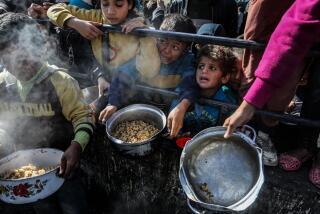Muslims Find Quiet, but Little Peace, in U.S. Recuperation : Bosnia: Madera physician volunteers to treat victims of faraway conflict. All five will return within two months, when they are better.
- Share via
MADERA, Calif. — Not even silence is sweet for Bosnian Muslims recovering from war injuries at a doctor’s house here among restful orchards and vineyards.
“When you go out from war and you don’t hear anything, peace will hurt your ears,” said 18-year-old Ligla Topcagic.
This respite is a gift from Madera physician Mohammed Arain, who wanted to treat victims of a war he had witnessed only in the news--and now through personal stories of five guests.
“The main hope was that we could get them well and, by the time they get well, that there will be peace in Bosnia,” Arain said. Other doctors, hospitals and pharmaceutical companies have helped.
“We just wanted to do something that was right,” said his wife, Zubaida. “In Bosnia, they don’t have the medicine and the antibiotics. They can’t do the longer surgeries. They don’t have the time; they don’t have the doctors.”
Topcagic said her journey to the United States began under the veil of a nighttime fog that let her and her fiance, Sabahudin Tricic, 23, sneak out of Sarajevo on their bellies last winter. They wanted to find medical help for Tricic, whose eyes had been gouged out by soldiers who raped his mother.
They went to a camp in nearby Croatia, which had links with an American organization that helped Arain sponsor their trip to Madera.
The fair-skinned teen-ager, slightly sunburned from swimming, comes across as wise beyond her years.
In addition to her fiance, Topcagic looks after three others in the doctor’s care. All five have shared a condominium Arain owns near Madera Community Hospital for nearly three months.
Mirhet Keric, 20, was paralyzed from the waist down after a bullet struck his spinal cord; Mujo Alibasic, 25, developed a bone infection from a bullet that was not removed by Bosnian doctors; and Zahid Mesanovic, 19, is missing an eye, a leg and a foot.
For all of them, life became a chain of broken silences after Bosnian Muslims and Croats voted to secede from Serb-dominated Yugoslavia in February, 1992. Serbs took up arms for an “ethnic cleansing” campaign, in which non-Serbs were killed or driven from their homes. The ensuing war has left more than 138,000 people dead or missing.
Topcagic, who speaks English, said the sound of shattering glass was piercing and compelling at first, but eventually there was no more glass to break.
At first, sirens, gunshots, and whistling grenades sent Topcagic and her neighbors into bomb shelters. But as people became bored by just plain survival, they began to take their chances in homes and on streets.
Percussion from distant explosions used to disturb her sleep, but “after a couple of months, it stopped waking me up,” Topcagic said.
She and Tricic, an engineering student before the war, had been engaged for a month when the soldiers gouged out his eyes.
In a vague way, the couple kept thinking about marrying, but “you can’t plan something for one particular day because you don’t know if you will live or die, if it will be quiet or not,” Topcagic said.
Even on quiet days, the justice of the peace may not be in, she said.
Now that Tricic has been fitted with fake eyeballs, and the couple’s lives have stabilized enough to make short-term plans, the wedding is back on for July.
But two months later, Tricic’s therapy and training will end and the couple will go home, as will the other Bosnians in the doctor’s care.
Topcagic wants to study, but the universities have closed and she knows from experience what sounds will fill her ears next.
“You can’t learn in a shelter,” she said. “I tried, but you can’t study with books. Children start screaming and women start crying, and you are helpless to do anything.”
More to Read
Sign up for Essential California
The most important California stories and recommendations in your inbox every morning.
You may occasionally receive promotional content from the Los Angeles Times.










